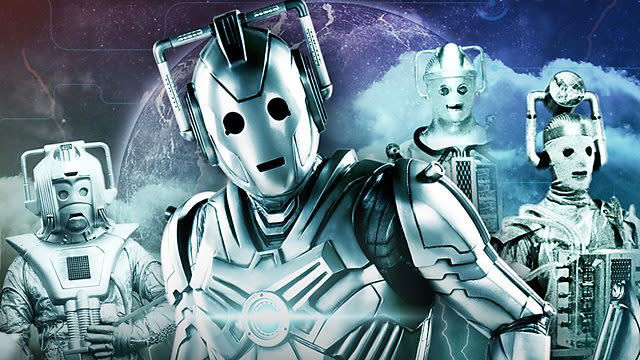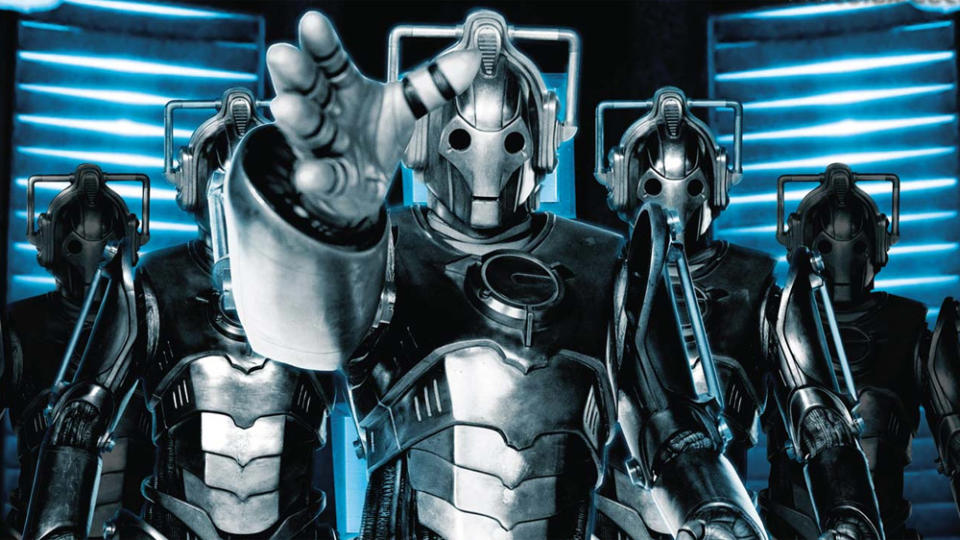Doctor Who and the Problem of the Cybermen


The Cybermen hold something of a difficult position in terms of the Doctor Who pantheon. Undeniably, they’re iconic; first introduced in 1966, the Cybermen have been making regular appearances ever since and are second only to the Daleks in terms of public perception.
But then, at the same time, that’s part of their problem - they’re second to the Daleks. Iconic though they may be, the Cybermen occupy the funny status of not really having any purpose beyond being “the other famous Doctor Who monster, who aren’t Daleks”. Particularly for the new series, while it’s easy to point to strong Dalek stories – Dalek being a clear contender – it’s much more difficult to do the same for the Cybermen. We’ve been lacking in any particularly strong stories for the Cybermen, as well as any instances where they may have been particularly scary. The reason for this, I think, is simple; there’s not really any clear angle from which to approach them.
The Daleks, initially an allegorical representation of the Nazis, are a symbol of our own capacity for hatred. The Sontarans are about jingoism and the destructiveness of war. The Autons are the most extreme juxtaposition of the mundane and the alien, coming to kill us with plastic. The Weeping Angels are monsters you can’t hide from behind the sofa. The list goes on; the most effective monsters, however, are the ones that have a clear hook, and a simple idea to build from.
The Cybermen? Well, they began as an expression of the creators’, Kit Pedler and Gerry Davis, concerns over organ transplant procedures and body modification, and the fear that humanity may one day augment itself to the point that it was no longer recognisable. It was a clever conceit in the 60s, but in an era where such medical advances have not only been accepted but also embraced, I’m not so sure that this is a concept that resonates in the same way. Indeed, Russell T Davies himself ultimately chose to replace this idea when it came to bringing the Cybermen back in 2006; however, the advanced technology angle he did go for ended up appearing rather dated even when broadcast, with its emphasis on Bluetooth style headpieces. With Apple looming in the background, the Cybermen seemed very… basic, at a time when it was more important than ever for them to seem cutting edge.
In 2013, Steven Moffat decided it was time for the Cybermen to receive another reinvention; he gave this task to Neil Gaiman, an extremely successful author who had written the previous year’s fantastic The Doctor’s Wife – it seemed a sure bet that Gaiman would be able to deliver on his promise to “make the Cybermen scary again”. In the end, the episode was lacking, and I’d put this down once more to a lack of a strong hook; without any central idea to base his reinvention around, Gaiman ended up essentially just throwing a lot of disparate concepts into the mix, none of which ultimately worked. The Cybermen ended up with super speed, nanotechnology, an overblown reputation, a central consciousness called the “Cyberiad”, and the ability to ‘adapt’ to any situation. None of which, in the end, made them ‘scary’.
Peter Capaldi’s first season saw the return of the Cybermen once again; this time, they were largely relegated to the stomping henchmen of Missy, who was the real villain of the finale. Some additions made were interesting; Moffat furthered Gaiman’s nanotechnology idea with the use of rain to convert people, which was rather clever, but also gave the Cybermen the ability to fly, which rather wasn’t. While Dark Water and Death in Heaven were undeniably compelling episodes of Doctor Who, I’d struggle to point to them as being compelling as a result of the inclusion of the Cybermen.

So that leaves us, then, with one question – just what do you do about the Cybermen? How do they work? What about them is interesting? Given all their reinventions across the years, there must be some aspect that can be picked up on and redeveloped into a new approach, no?
Interestingly, it may well be the very fact that they’ve been reinvented so many times that could provide the Doctor Who writers something to build off of. I think the idea was first put forward by Lance Parkin, a writer for the Doctor Who Expanded Universe; he posited that the various disparate threads of Cybermen we’ve seen (Mondas, Telos, Pete’s World, the various designs, so on and so forth) are in fact not simply one group, but really are essentially different species. The concept of Cyber-conversion is a recurring idea, which develops of its own accord on different plants, in different galaxies, even different universes; this, in turn, would allow a blank slate for the Cybermen whenever they appear. Maybe they’re wooden Cybermen. Maybe they have super speed. Maybe they’re linked to the Cyberiad. Maybe they come from this universe; maybe they don’t.
From there, it allows the writers to explore any number of concepts with these creatures, making the Cybermen the most flexible – the most adaptable – Doctor Who monster for any situation. Peter Capaldi has often stated he’d like to see a “Genesis of the Cybermen” style story, with Cybermen that are a little closer to man than machine; this concept isn’t beholden to any difficult continuity (like a tenth planet we all know doesn’t exist) when considered in light of the infinite capacity for reinvention the Cybermen have.
Perhaps you could come across Cybermen who are much more digital in nature; the ghost in the machine, a virus unleashed. Perhaps there are Cybermen who view the conversion process as a kindness; motivated by something that, if they had the words to express it, they would call pity. Perhaps there’s a society that has been built around a ritual of Cyber-conversion. Perhaps a planet at war converts their troops into the ultimate soldiers - Cybermen.
Maybe you could pick up on an idea that Russell T Davies toyed with in his Cybermen stories – Cybermen as a post-industrial, capitalist force, taking the homeless and the vulnerable, transforming them into the perfect worker and exploiting them for labour. That, I think, is an idea which resonates far moreso today than organ transplant anxiety ever could.
In the end, this allows for the Cybermen to become something far more nuanced and more complicated, and far more uniquely Doctor Who in style and substance, than they ever have been before. They wouldn’t be a nightmare in silver, or tin soldiers – they’d become just as mercurial as the Doctor himself.
Related:
Doctor Who - A tribute to Christopher Eccleston’s “Fantastic” Ninth Doctor
Ten Years of the Tenth Doctor Reviews
Like this article? Hate this article? Why not follow me on twitter for more, or send me a message on facebook to tell me what you thought? You can also find more of my articles for Yahoo here, or check out my blog here.


 Yahoo News
Yahoo News 
